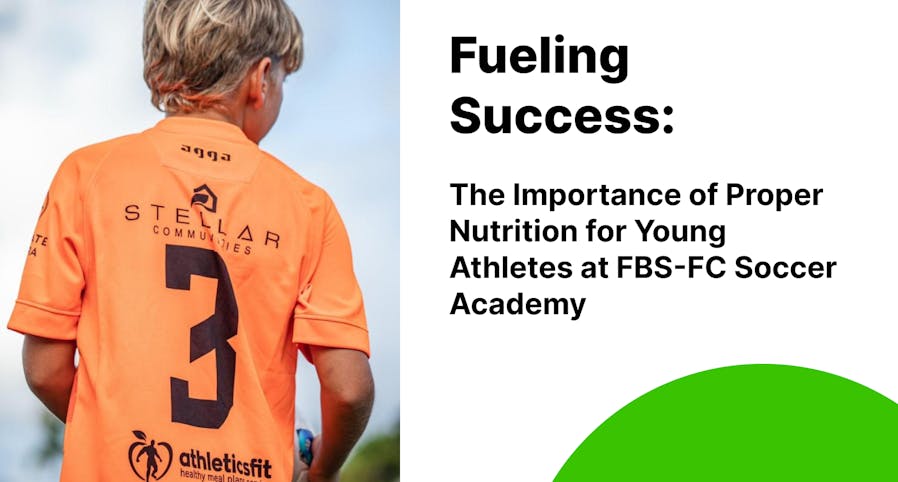Proper Nutrition for Young Athletes
This is Advise from Our AthleticsFit Nutritionist.
Nutrition plays a pivotal role in the development and success of young athletes at the FBS-FC Soccer Academy. As parents, you are instrumental in setting the right example for your children and helping them understand the significance of proper nutrition. In this article, we will explore why nutrition is essential for young soccer players and how you, as parents, can be the best role models in this important aspect of their athletic journey.
1. Building Blocks of Nutrition
Just as a well-constructed team relies on a strong foundation, a young athlete's body depends on a balanced diet to thrive. Proper nutrition provides the essential building blocks for growth, energy, and overall well-being. The key nutrients young soccer players need include:
a. Carbohydrates: Carbs are the body's primary source of energy, and for athletes, they are crucial for maintaining performance throughout a game.
- Whole-grain pasta
- Brown rice
- Quinoa
- Oats
- Whole-grain bread
- Sweet potatoes
- Fruits like bananas, oranges, and apples
b. Proteins: Proteins are essential for muscle repair and growth. They aid in recovery and building strength, a fundamental requirement for young athletes.
- Lean meats (chicken, turkey, lean beef)
- Fish (salmon, tuna)
- Eggs
- Greek yogurt
- Tofu or tempeh (for vegetarian options)
- Legumes (beans, lentils)
c. Fats: Healthy fats support various bodily functions, including brain development, hormone production, and energy storage.
- Avocado
- Nuts (almonds, walnuts, pistachios)
- Seeds (chia, flaxseed)
- Olive oil
- Fatty fish (salmon, mackerel)
- Natural nut butter (peanut, almond)
d. Vitamins and Minerals: These micronutrients are vital for overall health, immunity, and maintaining specific physiological functions.
- Leafy greens (spinach, kale)
- Colorful vegetables (carrots, bell peppers, broccoli)
- Berries (blueberries, strawberries)
- Citrus fruits (oranges, grapefruits)
- Dairy or fortified dairy alternatives (for calcium)
- Fortified cereals
e. Hydration: Staying properly hydrated is crucial for maintaining performance, especially in a sport as demanding as soccer.
- Water
- Coconut water
- Sports drinks (in moderation, for intense training sessions)
- Herbal teas (unsweetened)
2. The Role of Parents
As parents, you serve as powerful influencers in your children's lives, and your actions speak louder than words. Here's how you can lead by example in nurturing a culture of good nutrition for your aspiring soccer stars:
a. Balanced Meals: Ensure that family meals are balanced, with a variety of foods that incorporate all the necessary nutrients. This will demonstrate the importance of a well-rounded diet to your children.
b. Healthy Snacking: Encourage healthy snacks like fruits, vegetables, and nuts to replace sugary or processed alternatives.
c. Meal Planning: Involve your children in meal planning and preparation, teaching them about the importance of making healthy food choices.
d. Hydration Habits: Promote regular water consumption and limit sugary drinks. Dehydration can negatively impact athletic performance.
e. Mindful Eating: Practice mindful eating by sitting down together for meals, focusing on the food, and enjoying quality time as a family.
3. Performance and Recovery
Proper nutrition doesn't just fuel your child's game-day performance; it also aids in post-game recovery. After a rigorous practice or match, their bodies require the right nutrients to repair muscles, reduce inflammation, and replenish energy stores.
Foods rich in antioxidants, such as berries and leafy greens, can help reduce inflammation and muscle soreness. Lean proteins, like chicken or fish, are essential for muscle recovery, while complex carbohydrates, found in whole grains, can help replenish glycogen stores.
4. The Long-Term Impact
Instilling good nutrition habits in your children not only benefits their athletic pursuits but also sets them on the path to a healthier life. By teaching them to make informed food choices, you equip them with valuable skill that will serve them well in the future.
Conclusion
At the FBS-FC Soccer Academy, the importance of proper nutrition cannot be overstated. As parents, your role in modeling healthy eating habits is pivotal. You have the opportunity to shape your children's relationship with food, support their growth as athletes, and contribute to their overall well-being. By working together, we can help your young soccer players achieve their full potential on and off the field.
Get Started - https://afmeals.com

